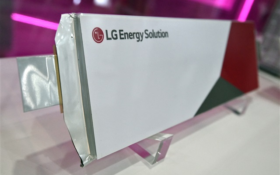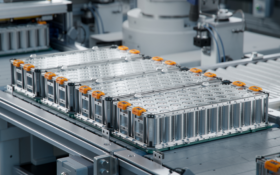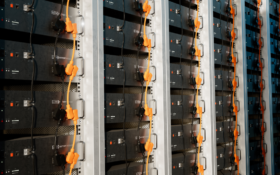Kokam has introduced the K-UPS series of high power Uninterruptible Power Supply (UPS) battery racks featuring Kokam’s Ultra High Power Lithium Nickel Manganese Cobalt Oxide (UHP NMC) battery technology.
The switch to lithium is based on growing data centre demand for lithium-ion UPS systems that can deliver high power for a short period of time at a lower cost than UPS systems using lead-acid batteries, the company claims.
According to Kokam, developers and operators of data centres are increasingly installing backup generators to produce power during long power outages. These long-term backup generators have decrease the need for UPS systems that can provide a high level of power for a long period of time, as these facilities now require high power for only a short period of time (less than 15 minutes), until the backup generators can come online.
However, most UPS systems use lead-acid batteries, and lead-acid batteries’ low power discharge rates force data centre developers and operators to purchase high capacity, long duration UPS systems to address their facilities’ short-term, high power needs.
This has resulted operators to seek new, more affordable UPS systems that require fewer batteries than lead-acid UPS systems to deliver the same amount of power. In addition, lead-acid UPS systems have large footprints, are heavy, require high maintenance, need significant cooling and ventilation and have to be replaced every 3-5 years.
The K-UPS batteries have a 10 C discharge rate compared to a 2 C-rate for most lead-acid batteries or a 4 C-rate for most other lithium-ion batteries This high power output enables UPS system providers to use fewer batteries .in a UHP NMC battery UPS system than lead-acid or other lithium-ion battery UPS systems, while delivering the same amount of power.
For example, K-UPS battery racks can provide up to a 500 % more power at the same level of battery capacity as most lead-acid UPS systems, or up to 250 %t more power at the same level of battery capacity as most other lithium-ion UPS systems. By using fewer batteries in their UPS systems, UPS system providers can lower the overall cost of these systems for data centre developers and operators, while still providing them with the high power, short duration performance they need.
‘Though the UPS market is still dominated by lead-acid batteries, rising data centre interest in more affordable, compact, long-lasting, lightweight UPS systems is growing the market for high power UPS systems using lithium-ion batteries,’ said Ike Hong, vice president of Kokam’s Power Solutions.












